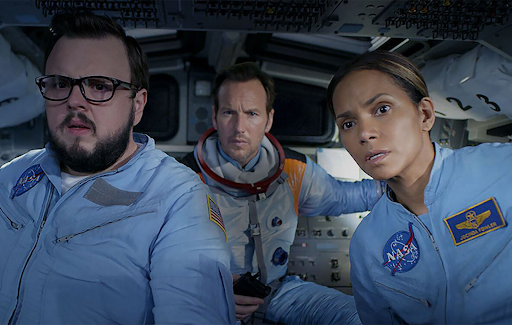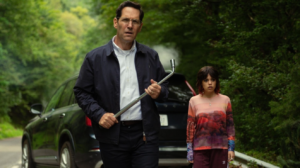Review: Moonfall, A Sad Sign of the Times 

Image Courtesy of NME/Lionsgate
By Dean Robbins
It is ironically fitting that Moonfall is promoting the purchase of an opening night ticket with the prospect of receiving a free NFT (non-fungible token), which depicts a piece of the collapsing moon from the movie. “Come see our movie and get a free crypto relic of humanity’s possible demise!” is what the promoters are implying. Director Roland Emmerich has always made optimistic movies, whether it be the patriotism of Independence Day and Midway or the fiery fight for justice in Stonewall. Moonfall, however, even at its most optimistic, is soberingly bleak.
The film is a catastrophe itself in more ways than one. At its best, Moonfall is what a disaster film looks like in a time when disaster is all around.
The plot of the film follows conspiracy theorist KC Houseman (GOT alum John Bradley) who has stumbled onto a great discovery: the moon is falling out of orbit. That is, as one might guess, a bit of a problem. A phone tip he gives eventually makes its way to the top officials of NASA, who discover he is correct. The moon is falling and the sand in the hourglass is running low for Earth and humanity alike. The solution quickly falls on the shoulders of Houseman, NASA official Jo Fowler (Halle Berry), and washed-up former astronaut Brian Harper (Patrick Wilson). The odds of humanity surviving are slim. Unlike the great communal rallying of Independence Day, the dominant response of the people in Moonfall is cowardice. The screenplay, from Spenser Cohen, Roland Emmerich, and Harald Kloser, is bursting not only with horrendous dialogue but also consistent distrust and distaste for authority. The government is ostensibly powerless and clueless. In the wake of a true disaster, the only solution for them is to hide in a bunker.
For our heroes, the crisis is much more personal than global. Jo Fowler is dealing with a divorce, Brian Harper is dealing with a criminal son (Charlie Plummer), and Houseman has little in his life beyond a bunch of crazed conspiracy theorist friends and a mother with severe dementia. These characters are far from aspirational. What makes them want to save the world is less a love for the world and more for the person next to them.
The movie has many of Emmerich’s famed turned-up-to-eleven scenes of destruction. In fact, the world is so utterly destroyed here by spells of reversed gravity, hundred-foot tall waves, and giant chunks of moon hitting the Earth that one wonders if there was anything left to save. These scenes are unfortunately quite terrible. The VFX is surprisingly one of the film’s weakest aspects. Some of the CG is, at times, so bad that one wonders if the $140 million budget is just an elaborate money-laundering scheme. The action scenes also stretch credibility to the moon. For instance, there is a scene where a car outdrives a wave that is hundreds of feet tall for what was seemingly many miles. The car physics are especially nonsensical throughout. Of course, common sense and physics are not what one expects from this sort of movie.
Without giving away direct spoilers, the writers ultimately imply that humanity may be destined to cause its own doom. If the margin of success is so narrow this time, will we be so lucky next time? Even worse, is the very idea of surviving and adapting to the disaster itself what will kill us all in the end? Here, in Emmerich’s eighth disaster film, it is the hurried, terrified run away from our own mortality that will lead us to the unseen pit of spikes that lies just ahead. That is where the emphasis on the personal comes in. Saving the world is, at its core, about saving one more moment for those we love even at the cost of one more moment for ourselves. Moon falling or not, you can save yourself and your loved ones valuable time by skipping this film. Moonfall is now playing in theaters.






